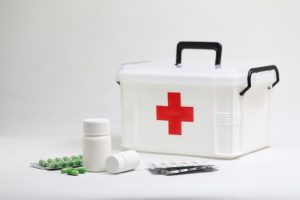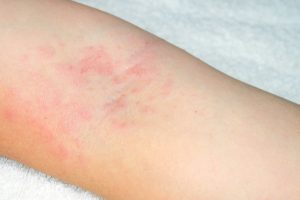The first visit to our office is the most important one that you or your child will have. During this visit we will take a very detailed medical history, review your past medical record and detailed patient information questionnaire and go over your current medication list. You may undergo various kinds of test during the visit depending on the nature of the problem. We will often uncover medical conditions and genetic tendencies for which you were unaware. Our staff will explain in detail why these conditions are present, their long-term consequences and best treatment options for long-term prevention. We will also try to answer all your questions.
Often when patients come for this initial visit they are surprised at the complexity of their problems and the amount of information they need to adequately care for their conditions in the future. Please understand that your 1st visit will usually take from 1 to 3 hours to complete. Be very careful not to schedule other appointments within 3 hours of this visit. If the length of this visit is not acceptable, it may be better to choose another allergy practice that better fits your time constraints.
It is very beneficial if you can do as much preparation ahead of time to get the very most out of your initial visit.
Past Medical Records
If you have previously seen a specialist in the areas of allergy, pulmonology, otolaryngology (ENT) or dermatology the records from that visit can be very beneficial. If you have ever had a CT scan of the sinuses it is extremely helpful for you to bring a copy of the CT scan itself or a CD ROM of the study to your visit (reports of the scan help but not nearly as much as seeing a copy of the actual scan). Copies of previous allergy skin or blood tests and lung function tests are very helpful for comparison to our tests. It is not generally necessary to obtain the records from your primary care physician unless your case is especially complex or rare.
Medications that Interfere with Allergy Testing
The following medications are anti-histamine medications and need to be avoided for 72 hours before the initial visit: Claritin (loratidine), Zyrtec (cetirizine), Allegra (fexofenadine), Clarinex, Xyzal, Hydroxyzine, Benadryl (diphenhydramine), Chlortrimeton (chlorpheniramine), Bromfed (brompheniramine) or any other similar medication (OTC medications that treat colds and are recommended for night time use or make you drowsy generally contain an antihistamine as do some cough medications). Pure decongestants like pseudoephedrine and phenylephrine that help with nasal congestion and sinus pressure are okay to stay on. Also stop antihistamine nasal sprays containing Azelastine (Astelin, Astepro, Dymista) and Patanase but it is okay to continue taking nasal sprays like Fluticasone, Nasonex, Nasacort, Omnaris, Rhinocort and Fluocinolone. The acid blocking medications Zantac (ranitidine), Pepcid (famotidine), Tagamet (cimetidine) and Axid (nizatidine) can also decrease skin test reactivity and should be stopped 12 hours before the visit. The two medications amitriptyline and nortriptyline must be stopped for 1 week before the visit because they block histamine for such along time after stopped.
The one exception is those patients with severe hives or swelling that need antihistamines to keep the condition from being intolerable. They should continue antihistamines if needed and we can skin test at a later time on other prevention meds if necessary.
Please do not stop inhalers, prednisone, Singulair (montelukast) or any other medication not for allergies or having antihistamine properties.
If you forget to stop the antihistamine medication it is still important to come to the visit since it can take many weeks to get another appointment to see our staff. Skin testing can always be done later at your convenience after the initial new patient visit.
Asthma Medications
In general we want patients to continue taking asthma medications prior to their visit but it can be very helpful to hold albuterol (Proair, Ventolin and Proventil), Xopenex, Maxair, Advair, Dulera and Symbicort on the morning of the visit. This allows us to perform a lung function test before and then after a quick relief inhaler to determine its effect. If this causes undo respiratory discomfort or distress then it is better to go ahead and take these medications the morning of the visit.
Special Considerations for Children
a. Please make arrangements for child care for your other children so that they can remain at home. Our initial visits can run several hours and a number of very complex issues will need to be explained which is exceedingly difficult with other children competing for attention in the room. If your child is a very active toddler it can also be helpful if another adult comes with you to entertain them while Dr. Malone is explaining his findings and treatment plan.
b. When possible it is very helpful if both parents can come to the initial appointment. Many of the medical conditions, which we discuss, are difficult to explain to others after the fact. We also find that when both parents are present much more of the information that is discussed is understood and remembered.
c. It is also essential that the primary caregiver for the child be present for the visit. When children are sent to the visit with relatives or friends who don’t provide the majority of the medical and day-to-day care of the child, the transfer of appropriate knowledge and understanding to the real caregiver is lost thus harming the ultimate medical care of the child. If a parent cannot miss work for the appointment they must be available by cell phone to listen in on the history and then the explanation of the medical conditions and care needed.
d. When children reside in several different homes on a routine basis it is imperative that a caregiver from each household be present at the initial visit so that an accurate history can be obtained and both sets of caregivers understand and agree upon the care that is to be provided in the future. We have had so many problems in the past with disagreements between joint custody caregivers that we will no longer treat children and give medical advice at the initial visit unless both households are represented. Occasionally there are extenuating circumstances that prevent us from having both households represented. These situations should be communicated to our receptionist ahead of time and permission given to proceed with the visit with only one parent or representative in joint custody households present for the first visit.
Initial Visit Instructions:
1. Make sure you have your Insurance Card and at least one form of ID on hand.
2. Make sure you are on time for your appointment.
3. Make sure you have been off of antihistamines 3 days prior to your appointment ex: benadryl, claritin, zyrtec, some cough and cold medicines, to prevent false test results.
4. IF YOU NEED TO RESCHEDULE YOUR APPOINTMENT, PLEASE DO SO AT LEAST 3 BUSINESS DAYS IN ADVANCE. OUR OFFICE HOURS ARE MON-THURS. -SO KEEP IN MIND THAT THE BUSINESS DAYS DO NOT COUNT FOR FRI., SAT. OR SUN.!! FAILURE TO DO THIS WILL INHIBIT FUTURE APPTS. WITH OUR STAFF***
Thank you for your cooperation!
The Southeast Asthma & Allergy Center, PC



